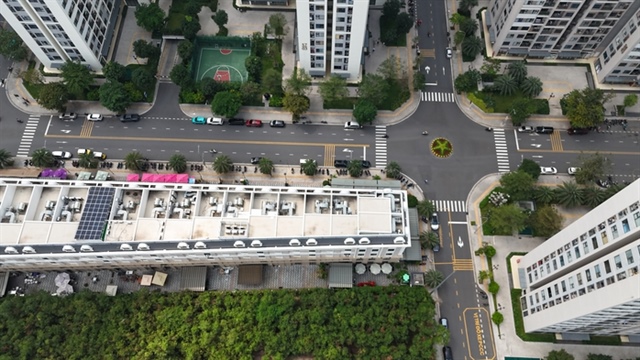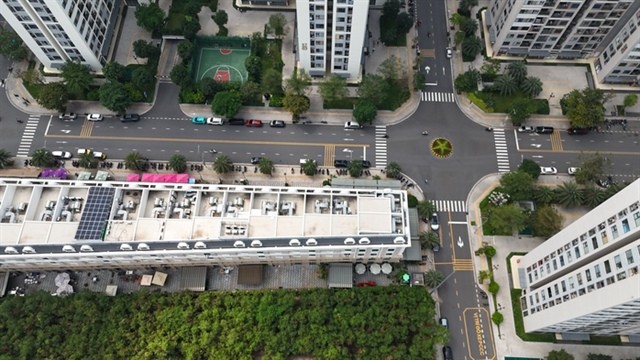“**Cracking Down on Real Estate Market Manipulation: Vietnam’s Government Takes a Stand**”
At a recent meeting between the Government’s Standing Committee and ministries, associations, banks, and businesses regarding the real estate market situation, Prime Minister Pham Minh Chinh gave strict directives on handling speculative and manipulative practices in the market. He specifically instructed the Ministry of Finance to urgently research and implement policies to tax unused land and housing, as well as profit gains, and to address unclear transactions.
Urgent Need for Action
Mr. Doan Quoc Duyet, Director of Viet Tin Thanh Real Estate Company, shared his views on measures to counter speculation and market manipulation. He emphasized the need for a robust legal framework to provide accurate information to buyers. He also suggested stronger government intervention in supply and demand, as some developers base their sales on available capital rather than market needs, creating an imbalance that speculators exploit.
Mr. Duyet proposed the extensive use of technology in real estate transactions to monitor market activities and prevent fraudulent sales. He also highlighted the crucial role of inter-ministerial coordination in reducing misinformation, curbing price gouging, and stabilizing the market.
 Experts and businesses alike agreed with the Prime Minister’s directive to take stringent action to prevent chaos and maintain control in the housing market. Photo: TRANG NGUYEN |
Mr. Le Hoang Chau, Chairman of HoREA (Ho Chi Minh City Real Estate Association), echoed the sentiment, stating that the Prime Minister’s strong stance indicates the priority given to the development of the real estate business in the coming years. He emphasized the urgency of countering speculation, manipulation, and price gouging to establish a transparent and healthy market.
Mr. Chau suggested distinguishing between entities at risk of manipulation, citing the example of land auction price manipulation, where an individual with multiple land holdings in an area can artificially inflate prices to benefit their other properties. He advocated for stricter penalties, such as confiscating deposits and imposing temporary bans on participating in auctions, to be included in the Law on Handling Administrative Violations.
One of his key proposals was the establishment of a national-level real estate exchange, distinct from the current private exchanges primarily dealing with individual apartment transactions. This exchange would focus on products with clear origins and legal status. He also recommended increasing the deposit ratio in auctions and tenders to deter speculation, with careful consideration to avoid burdening genuine homebuyers.
Leveraging Tax Tools
The HoREA Chairman also suggested concrete solutions, including tax policies. He referenced the US real estate tax model, which levies a 1.21% tax on asset value annually, effectively regulating and renewing the real estate cycle. In Vietnam, the Ministry of Finance is proposing a 20% tax on real estate transfers for profit, which requires a transparent database to ensure fairness and public trust.
However, Mr. Chau cautioned against a uniform tax rate for diverse assets. He argued that small rural houses shouldn’t be taxed similarly to Ho Chi Minh City villas. He also emphasized the need for digital infrastructure, electronic personal identification codes, and a national land database to support efficient and transparent tax management and collection. Additionally, he advocated for effective communication to encourage honest declarations, with detailed land price tables constructed to match market values.
From a professional perspective, Mr. Nguyen Van Duoc, General Director of Trong Tin Accounting and Tax Consulting Company, argued that the current low real estate transfer tax encourages speculation and land hoarding. He analyzed the issues with the current tax structure and advocated for a return to a 20% profit-based tax, made feasible by advancements in cashless payments and transaction registration.
Mr. Duoc also proposed developing a national real estate transaction database, enhancing supervision, and holding public notaries, exchanges, and buyers accountable for accurate cost reporting to facilitate transparent tax management.
Mr. Dong Minh Hong, Director of DVL Tax Agency Ltd., agreed that a 20% profit-based tax is reasonable and should be applied to individuals to ensure fairness with businesses. He added that this measure would reduce real estate hoarding and curb speculative price increases. Mr. Hong suggested that in the initial phase, fraudulent price declarations could be treated as tax evasion, a criminal offense, to promote market transparency and health.
|
Tackling Deceptive “Brokerage” Practices Attorney Tran Quoc Bao, Ho Chi Minh City Bar Association, underscored the significance of real estate as a substantial asset that many aspire to own. However, he warned that a lack of legal and market knowledge creates an environment ripe for exploitation by deceptive brokers who manipulate prices and buyers’ psychology. He urged authorities to take decisive action to prevent market chaos and loss of control. Mr. Bao explained that most fraud cases involve civil transactions where buyers voluntarily and legally sign contracts and make deposits, making it challenging to determine if prices are accurate or manipulated. He referenced the case of Ms. Mai Lien from Ho Chi Minh City’s District 11, who was lured into purchasing land in Bao Loc, Lam Dong, for VND 1.3 billion, despite its actual value being only VND 300-400 million. Ms. Lien pleaded for authorities to intervene and eradicate deceptive brokerage practices to bring order to the market. |
SON NHUNG – THY THO
The Audacity to Advertise: “The Grand Vung Tau Coastal Urban Project” Without an Investor
Despite having no investors, the 3rd of February Road Urban Area in Vung Tau City has been aggressively advertised and booked on social media.


















